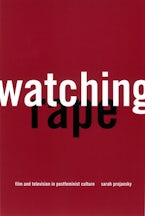Watching Rape
Film and Television in Postfeminist Culture
Looking at popular culture from 1980 to the present, feminism appears to be "over": that is, according to popular critics we are in an era of "postfeminism" in which feminism has supposedly already achieved equality for women.
Not so, says Sarah Projansky. In Watching Rape, Projansky undermines this complacent view in her fascinating and thorough analysis of depictions of rape in U.S. film, television, and independent video. Through a cultural studies analysis of such films as Thelma and Louise, Daughters of the Dust, and She's Gotta Have It, and television shows like ER, Ally McBeal, Beverly Hills 90210, and various made-for-tv movies, Projansky challenges us to see popular culture as a part of our everyday lives and practices, and to view that culture critically. How have media defined rape and feminism differently over time? How do popular narratives about rape also communicate ideas about gender, race, class, nationality, and sexuality? And, what is the future of feminist politics, theory, and criticism with regard to issues of sexual violence, postfeminism, and popular media?
The first study to address the relationship between rape and postfeminism, and one of the most detailed and thorough analyses of rape in 25 years, Watching Rape is a crucial contribution to contemporary feminism.
Contributor Bios
Reviews
"Blending cinematic, literary, historical, and political analyses, Watching Rape demonstrates that filmic representations of rape are never only about gender and sexual violence, but are narrative devices that also attempt to regulate such conflicts and boundaries of power as race, nationality, and social class. Projansky makes good on her bold claim that representations of rape are ubiquitous, versatile, and utterly central to the history of cinema itself. A scholarly tour de force, a feminist triumph. Two thumbs up!" ~ Judith Stacey,University of Southern California
"Exciting and original. Sarah Projansky's work on rape and postfeminism is an important contribution to scholarship in film and cultural studies, as well as women's studies." ~ Richard Slotkin,author of Gunfighter Nation
"Sarah Projansky's work is distinctive for its theoretical clarity and interdisciplinary feminist framework. She urges us to think deeply about the ways in which media shape our understandings of sexual violence. Watching Rape is a powerful, historically grounded, incisive analysis of the representation of sexual violence." ~ Rosa Linda Fregoso,University of California-Santa Cruz
"Watching Rape is a compelling account of the role of the rape in making meaning and re-inscribing inequalities within visual media, and as such it is a necessary and valuable research contribution." ~ Leslie Kern,School of Women’s Studies, York University
 This work is licensed under a
Creative Commons Attribution-NonCommercial-ShareAlike 4.0 International License
(CC BY-NC-SA).
This work is licensed under a
Creative Commons Attribution-NonCommercial-ShareAlike 4.0 International License
(CC BY-NC-SA).


